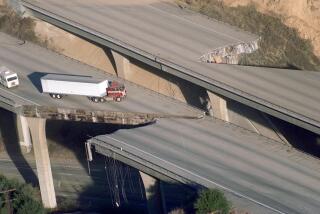Visitors See Rebuilding the U.S. Way
- Share via
SANTA CLARITA — The delegation visiting from the Balkans took pictures and stood in the shadow of the concrete freeway overpasses repaired after the Northridge earthquake. They huddled intently around George Caravalho, Santa Clarita’s city manager, as he explained how the structure over Gavin Canyon was finished in four months.
“Is it true?” asked an incredulous Stjepan Dujmovic, a municipal official from Croatia. Perhaps, Dujmovic wondered, Caravalho might be exaggerating in his explanation of how the 80-foot bridges were resurrected after the quake.
That such a massive project could be completed so quickly baffled the city planner from an area where old communist principles promoted the stretching out of work projects to keep people employed for years.
“We had this old system,” he said. “Now it’s hard to get this [idea of efficiency] into our heads.”
It was the American way with construction schedules, government financing and bureaucratic minutiae that intrigued Dujmovic and the nine others in the delegation. They have been visiting the United States for about a month under a training program sponsored by the U.S. Agency for International Development and run by American Cultural Exchange, a private education and training organization.
They stopped by Santa Clarita on Monday to learn about emergency preparedness. Caravalho meticulously explained how planning and training helped the city as it faced more than $400 million in damage from downed bridges, shattered gas lines and crises that followed the earthquake.
The delegation of municipal leaders from Bosnia and Croatia seemed interested but could not hide the fact that they had been dealing with emergencies as bad or worse for four years.
When talk turned to the interruption of water supplies in Santa Clarita in the days after the quake, Draga Petricic, a lawyer for the Croatian port city of Zadar, pointed out that her community had been without water for three years. It was restored only recently.
Nonetheless, she said later, seeing how municipal government works in the United States was useful for her as she moves to take part in the rebuilding of her city.
“We understand that America has greater capital and more ability to deal with this sort of thing,” she said. “But we are here to learn.”
They searched for parallels. Copies of organizational charts seemed to be met with flashes of recognition, as did discussions of municipal jobs, like those of building inspectors.
Yet even where there were parallels, there were differences. Dujmovic asked how many inspectors were sent to earthquake-ravaged homes for damage assessment. When Caravalho said one, Dujmovic shook his head. His bureaucracy-laden nation sends three people to inspect each war-damaged house.
Yet, the conversation constantly returned to reconstruction, and especially to money. Caravalho could offer little comfort on that one, as he explained that the federal government stepped in to finance the immediate reconstruction effort after the Northridge quake.
“They’re facing a tremendous problem,” Caravalho said, “namely, how are they going to pay for this?”
Sead Avdic, vice mayor of the Bosnian city of Tuzla, couldn’t help but be cheered by the fact that U.S. troops are expected to be sent to his city as the result of the peace agreement recently struck in Dayton, Ohio.
Troops under North Atlantic Treaty Organization command would be more effective than those of the United Nations, Avdic hoped. Almost as important, they would be good for his city’s economy.
“We need a lot of help in Bosnia,” he said.
That’s why the visitors seemed intent on Caravalho’s explanation of the Gavin Canyon project. The original contract for the project was for $14.8 million. The company that worked round-the-clock to build it won a bonus of $4.5 million for finishing ahead of schedule.
Avdic listened to Caravalho explain the bonus.
As the peace deal in the Balkans lurches toward reality, his thoughts the entire day seemed directed to factories, production and business. His U.S. tour highlight so far has been Microsoft in Seattle, a symbol of the future his region wishes to join.
Caravalho did his best to tailor his talk to the group’s interests. He suggested that planning and preparation would be useful for the Balkans as it sets out to rebuild.
“You have to have a vision of what you want,” Caravalho said.
“We have it,” quipped Avdic. “But we don’t have the funds.”
More to Read
Sign up for Essential California
The most important California stories and recommendations in your inbox every morning.
You may occasionally receive promotional content from the Los Angeles Times.













